|
|
|
| Interviews met Israëlische jongeren |
|
|
|
|
 Einat Podjarny (links), Ophra (midden-links), Kerem Blumberg (midden-rechts) en Barak Sharabi (rechts) Aan het woord komen verderop ook: Ido en Noam. EINAT PODJARNY 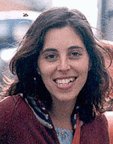 Ik ben Einat Podjarny. Ik ben 26 jaar en ik woon in Jaffo*. Ik studeer geschiedenis, maar een groot deel van mijn tijd besteed ik aan mijn activiteiten voor Ta’ayush. Ta’ayush betekent “samenleven”. In Ta’ayush werken Israëliërs en Palestijnen samen aan een gemeenschappelijke toekomst. Ik woon in een woongroep samen met Israëliërs en Palestijnen.
* oude havenplaats, opgeslokt door Tel Aviv
De vraag of het een “muur” is of een “hek”, of hoe ze het ook noemen, klopt niet. Ik gebruik liever de meervoudsvorm: “walls and fences”. Er is niet éen muur, of één hek. Er is een systeem van barrières, nederzettingen, hekken, checkpoints, uitgaansverboden, curfews enz. De “muur” is een laatste manifestatie van dit systeem, van een politiek die al heel lang wordt gevoerd. De muur is een escalatie van deze politiek van annexatie, uitsluiting, onderdrukking en afscheiding.
Alles wordt hier in dit land gelegitimeerd vanwege de “veiligheid”. Misschien dat de muur op korte termijn voorkomt dat terroristen Israël binnenkomen. Maar ik ben ervan overtuigd dat op de lange termijn de veiligheidssituatie verslechtert. De onderdrukking zal weer nieuwe terroristen creëren. Geweld leidt tot meer geweld. En uiteindelijk zullen mensen toch wel nieuwe manieren vinden om de barrières te omzeilen. Kijk naar Gaza: er staat een hek omheen, maar de laatste tijd gebeurt het meer en meer dat ze ook via Gaza binnenkomen. De muur lost de oorzaken van het probleem niet op en het is moreel verwerpelijk.
Dat de muur wordt gebouwd in de Bezette Gebieden toont aan dat het gaat om te annexeren van land. Het is het bewijs van de echte betekenis. Muren en hekken zijn niet de manier om het conflict op te lossen. Een conflict kan niet opgelost worden door één partij die de ander zijn wil oplegt. Voor een echte oplossing is het nodig dat beide partijen tot een vergelijk komen. Stel dat ze allebei een muur zouden wil bouwen: in dat geval zou ik me niet verzetten. Maar dat is nu overduidelijk niet het geval.
Voor mij betekent de muur dat de barrières tussen Israëliërs en Palestijnen alleen maar groter zijn geworden. Er is nu ook een fysieke grens gecreëerd. We kunnen elkaar bijna niet meer ontmoeten. Hierdoor is er geen dialoog meer en neemt het begrip tussen ons alleen maar verder af. Op deze manier worden toekomstige oplossingen gefrustreerd. Voor echte oplossing is er dialoog nodig.
Ik heb al gezegd dat alles hier in het teken staat van “veiligheid, veiligheid en nog eens veiligheid”, maar het is een belachelijk duur project, het kost enorme sommen geld. Het gaat óók ten koste van ónze economie. Als de Palestijnen economisch gezien aan de rand van de afgrond staan dan heeft dit net zo goed gevolgen voor Israël. Wist je dat we sinds kort, als we benzine tanken, één shekel* per tankbeurt moeten bijdragen aan de bouw van de muur?
* 1 shekel = 18 eurocent
De muur slokt al onze energie op. Het is een gigantisch project, een monster. Het gaat maar door. Maar het échte probleem blijft de bezetting, hoe we hier in dit land met elkaar omgaan. Dat dreigt allemaal overschaduwd te worden, maar we moeten ons nu verzetten, we moeten de Israëlische publiek opinie vertellen wat er aan de hand is. De meeste mensen denken nog steeds dat de muur gewoon een hek langs de grens is! Tussen”wij”en “zij”. Onzin natuurlijk. Alles loopt door elkaar, kijk naar de nederzettingen.
Je moet een activist nooit vragen of hij of zij zal winnen of verliezen … maar de muur zal eens moeten verdwijnen en hij zal verdwijnen! Er wordt u een humanitaire ramp gecreëerd. De Westbank is in stukken gesneden. In Jeruzalem zal het ooit tot een uitbarsting komen, net zoals in het noorden van de Westbank. Je kunt mensen niet oneindig tot het uiterste drijven. De muur heeft het hele idee en concept van een Palestijnse staat als oplossing vernietigd. Het wordt nu een veel complexer debat. De muur verandert het conflict en de gevolgen hiervan kunnen we helemaal niet voorzien.
In Ta’ayush werken we al heel lang aan de muur. In het begin, dus een paar jaar geleden, wist niemand wat er aan de hand was. We probeerden te begrijpen wat er stond te gebeuren. Toen dat duidelijk werd zijn we de mensen gaan informeren. We hebben mediacampagnes gevoerd en ik denk dat we uiteindelijk de boodschap er wel door hebben gekregen. Ta’ayush is directe actie, we willen een breed verzet tegen de muur. We voeren geweldloze acties samen met de “Popular Committees” in de Westbank. Dat zijn onafhankelijke groepen die los staan van de Palestijnse Autoriteit. Dat we samen actie voeren heeft nog een bijkomend voordeel: het geeft ook een bescherming. Israëlische soldaten schieten minder snel met scherpe munitie als er onder de demonstranten ook Israëliërs zijn.
Wij voeren vooral acties in de kleine dorpen. Deze zijn vaak erg geïsoleerd. Dáár wordt de grond onteigend, worden huizen en boomgaarden vernield, en dáár wordt de muur gebouwd. Tot voor kort wisten de mensen in de dorpen vaak niet wat ze boven het hoofd hing. OK, ze wisten dat er een muur kwam, maar ze beseften vaak de gevolgen niet: dat ze niet meer naar hun land kunnen, dat ze door een poort moeten etc. Wij gingen dan vaak naar ze toe en probeerden uit te leggen wat er aan de hand was.
Als Ta’ayush willen we duidelijk maken wat er aan de hand is in de Bezette Gebieden. We willen een stem geven aan de slachtoffers van de muur. Met onze geweldloze acties die we samen met Palestijnen doen tonen we ons solidair. Het klinkt gek en misplaatst: maar je kan zeggen dat de muur niet alleen verdeelt, maar ook mensen met elkaar verbindt die voor hetzelfde doel willen vechten: voor rechtvaardigheid en gelijkheid. Ik ben Einat Podjarny. Ik ben 26 jaar en ik woon in Jaffo*. Ik studeer geschiedenis, maar een groot deel van mijn tijd besteed ik aan mijn activiteiten voor Ta’ayush. Ta’ayush betekent “samenleven”. In Ta’ayush werken Israëliërs en Palestijnen samen aan een gemeenschappelijke toekomst. Ik woon in een woongroep samen met Israëliërs en Palestijnen.
* oude havenplaats, opgeslokt door Tel Aviv
De vraag of het een “muur” is of een “hek”, of hoe ze het ook noemen, klopt niet. Ik gebruik liever de meervoudsvorm: “walls and fences”. Er is niet éen muur, of één hek. Er is een systeem van barrières, nederzettingen, hekken, checkpoints, uitgaansverboden, curfews enz. De “muur” is een laatste manifestatie van dit systeem, van een politiek die al heel lang wordt gevoerd. De muur is een escalatie van deze politiek van annexatie, uitsluiting, onderdrukking en afscheiding.
Alles wordt hier in dit land gelegitimeerd vanwege de “veiligheid”. Misschien dat de muur op korte termijn voorkomt dat terroristen Israël binnenkomen. Maar ik ben ervan overtuigd dat op de lange termijn de veiligheidssituatie verslechtert. De onderdrukking zal weer nieuwe terroristen creëren. Geweld leidt tot meer geweld. En uiteindelijk zullen mensen toch wel nieuwe manieren vinden om de barrières te omzeilen. Kijk naar Gaza: er staat een hek omheen, maar de laatste tijd gebeurt het meer en meer dat ze ook via Gaza binnenkomen. De muur lost de oorzaken van het probleem niet op en het is moreel verwerpelijk.
Dat de muur wordt gebouwd in de Bezette Gebieden toont aan dat het gaat om te annexeren van land. Het is het bewijs van de echte betekenis. Muren en hekken zijn niet de manier om het conflict op te lossen. Een conflict kan niet opgelost worden door één partij die de ander zijn wil oplegt. Voor een echte oplossing is het nodig dat beide partijen tot een vergelijk komen. Stel dat ze allebei een muur zouden wil bouwen: in dat geval zou ik me niet verzetten. Maar dat is nu overduidelijk niet het geval.
Voor mij betekent de muur dat de barrières tussen Israëliërs en Palestijnen alleen maar groter zijn geworden. Er is nu ook een fysieke grens gecreëerd. We kunnen elkaar bijna niet meer ontmoeten. Hierdoor is er geen dialoog meer en neemt het begrip tussen ons alleen maar verder af. Op deze manier worden toekomstige oplossingen gefrustreerd. Voor echte oplossing is er dialoog nodig.
Ik heb al gezegd dat alles hier in het teken staat van “veiligheid, veiligheid en nog eens veiligheid”, maar het is een belachelijk duur project, het kost enorme sommen geld. Het gaat óók ten koste van ónze economie. Als de Palestijnen economisch gezien aan de rand van de afgrond staan dan heeft dit net zo goed gevolgen voor Israël. Wist je dat we sinds kort, als we benzine tanken, één shekel* per tankbeurt moeten bijdragen aan de bouw van de muur?
* 1 shekel = 18 eurocent
De muur slokt al onze energie op. Het is een gigantisch project, een monster. Het gaat maar door. Maar het échte probleem blijft de bezetting, hoe we hier in dit land met elkaar omgaan. Dat dreigt allemaal overschaduwd te worden, maar we moeten ons nu verzetten, we moeten de Israëlische publiek opinie vertellen wat er aan de hand is. De meeste mensen denken nog steeds dat de muur gewoon een hek langs de grens is! Tussen”wij”en “zij”. Onzin natuurlijk. Alles loopt door elkaar, kijk naar de nederzettingen.
Je moet een activist nooit vragen of hij of zij zal winnen of verliezen … maar de muur zal eens moeten verdwijnen en hij zal verdwijnen! Er wordt u een humanitaire ramp gecreëerd. De Westbank is in stukken gesneden. In Jeruzalem zal het ooit tot een uitbarsting komen, net zoals in het noorden van de Westbank. Je kunt mensen niet oneindig tot het uiterste drijven. De muur heeft het hele idee en concept van een Palestijnse staat als oplossing vernietigd. Het wordt nu een veel complexer debat. De muur verandert het conflict en de gevolgen hiervan kunnen we helemaal niet voorzien.
In Ta’ayush werken we al heel lang aan de muur. In het begin, dus een paar jaar geleden, wist niemand wat er aan de hand was. We probeerden te begrijpen wat er stond te gebeuren. Toen dat duidelijk werd zijn we de mensen gaan informeren. We hebben mediacampagnes gevoerd en ik denk dat we uiteindelijk de boodschap er wel door hebben gekregen. Ta’ayush is directe actie, we willen een breed verzet tegen de muur. We voeren geweldloze acties samen met de “Popular Committees” in de Westbank. Dat zijn onafhankelijke groepen die los staan van de Palestijnse Autoriteit. Dat we samen actie voeren heeft nog een bijkomend voordeel: het geeft ook een bescherming. Israëlische soldaten schieten minder snel met scherpe munitie als er onder de demonstranten ook Israëliërs zijn.
Wij voeren vooral acties in de kleine dorpen. Deze zijn vaak erg geïsoleerd. Dáár wordt de grond onteigend, worden huizen en boomgaarden vernield, en dáár wordt de muur gebouwd. Tot voor kort wisten de mensen in de dorpen vaak niet wat ze boven het hoofd hing. OK, ze wisten dat er een muur kwam, maar ze beseften vaak de gevolgen niet: dat ze niet meer naar hun land kunnen, dat ze door een poort moeten etc. Wij gingen dan vaak naar ze toe en probeerden uit te leggen wat er aan de hand was.
Als Ta’ayush willen we duidelijk maken wat er aan de hand is in de Bezette Gebieden. We willen een stem geven aan de slachtoffers van de muur. Met onze geweldloze acties die we samen met Palestijnen doen tonen we ons solidair. Het klinkt gek en misplaatst: maar je kan zeggen dat de muur niet alleen verdeelt, maar ook mensen met elkaar verbindt die voor hetzelfde doel willen vechten: voor rechtvaardigheid en gelijkheid.
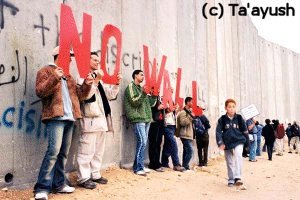 Over Ta’ayush
Over Ta’ayushTa’ayush is een Arabisch-Joods partnerschap. Hun stelling luid als volgt: “Wij -Joodse en Arabische burgers van Israël- leven omgeven door muren. Muren die ons van elkaar scheiden, muren die de Palestijnen in de west Bank en Gaza gevangen houden. Zolang Israël een gewapend fort is in het hart van het Midden Oosten, zullen de muren van de oorlog ons gevangen houden”. Het doel van het partnerschap is om ‘de muren van haat en racisme neer te halen’. Ze willen dat Israël zich terugtrekt uit de Westelijke Jordaanoever en dat alle burgers van Israël met evenveel respect worden behandeld. OPHRA, IDO EN NOAM Vragen die we hebben gesteld aan Ophra, Ido en Noam, joodse jongeren: De regering van Israël bouwt een muur:
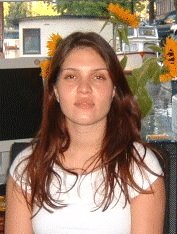 Ophra
Ophra20 jaar, eerstejaars studente psychologie uit Amsterdam, gaat regelmatig bij familie in Israël op bezoek.
24 jaar, onderwijzer, woont in Hedera, Israël.
23 jaar, net uit militaire dienst, wil daarna gaan studeren, woont in Vardes Gana, Israël.
ESSAY KEREM BLUMBERG Kerem Blumberg, 17 jaar, woont in Tel Aviv, vredesactiviste. 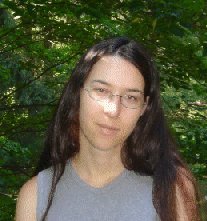 Dear readers,
I don’t have a “proper” introduction to write, so I will just explain my point of view of the fence and my ways of dealing with this issue.
Dear readers,
I don’t have a “proper” introduction to write, so I will just explain my point of view of the fence and my ways of dealing with this issue.The fence is supposedly built in order to protect me. That’s what Sharon says. They say it’s not a political fence. I don’t believe that. It is a fence that is built to separate me from my neighbours so I will not see them as humans, and in order to annex as much land as possible to Israel. You must understand, Israel is very, very afraid that Israelis and Palestinians will become friendly with each other, will communicate in any way. Until I was like 13 I didn’t even realize that occupied territories were so close to where I live. The media and government portray the Palestinians as some kind of monsters. Most Israelis don’t even know that more Palestinians get killed every month than Israelis, not because they have no way to find out the truth, but because the anti-Palestinians propaganda is so overwhelming, they don’t bother to check for facts. Many Israelis think the Palestinians should go live somewhere else- they don’t care where. But they think its HORRIBLE and inhuman that Palestinians (ALL of them of course- they all have one face, and hold the same opinion) think we should be thrown to the sea. The Israeli school system is a brainwash from day one. It tells you joining the army does protect your country, they talk about the Jewish people who had no country to go to after the war, where would they live with all the Anti-Semitism? We are a country surrounded by enemies, we must defend ourselves. My question is- how does occupying 3.5 million people for 37 years settle with the declaration of being such a weak little country with a humble wish to save and protect its people’s lives? Isn’t Israel feeding its enemies with pure hatred with this occupation? You have no way to question things in school, when you have to stand a minute of silence in memory of all the brave soldiers (“who died so you could be here today!”) once a year since you are 6. The wars are glorified, not being learned a lesson from. The government has a sort of “what-can-we-do?” attitude towards the occupation. (There was a shooting yesterday, we must go in to Rammalah and just shoot for the hell of it, so we don’t look weak to the Palestinians. It doesn’t really matter how many innocent people get killed, they aren’t properly reported on the news anyway, and if we have a soldier killed it will be an even better excuse to go in again, etc, etc.) Israelis think the occupation and the occupying army is protecting them. How can occupation be thought of as protection? How can Israelis expect the Palestinians to do nothing when they are arrested, beaten up, humiliated, killed and injured every single day? And for the mere reason that they have a different blood than us, that they live a mile off to the wrong direction. So Israelis think the best way is separation. On the surface it looks so innocent, your neighbor annoys you, so you build a fence between your gardens. What clearly most Israelis don’t understand is that the fence passes right in front of your neighbors back-door. Its blocks his view of the garden and the sky as well as annexing his rose bed and sprinkler to your garden. What’s worse is that you were thinking of taking some of his garden secretly, even before you moved in. Would any Israeli agree to share his trees and flowers with anyone else? And how about when it’s done without asking them? They say the fence isn’t political. The fence is built in a path that makes sure all the (illegal!) settlements which were built beyond the Green Line, stay on the Israeli side. The settlements which were built by mostly Zionist’ fanatics who just go and build their house where-ever they please on other people’s land and make their life a total hell (with full police and army protection. Now they get a prize from the government who helps them make the Palestinians’ lives even worse, so a few settlers who don’t represents even half of the Israeli people’s views could live peacefully and permanently with a 8 meters high concrete wall just slightly more on the Palestinians’ land, and an official recognition of their crimes in an apartheid dream-land. This makes me furious. These settlers see their land as more important than the safety of their children, and more important than the lives and dignity of people which they consider as inferior than them. These are Jews who protest against Anti-Semitism, religious prosecution, racism? These thoughts lead me in my fight against the fence and the occupation. I have been very environmentally aware since I was a child. I became a vegetarian at the age of 10, a vegan at the age of 15, and always thought it important to fight against discrimination, chauvinism, homophobia, and for animal rights. I became more involved in these subjects in the past 2 years. I went to some protests about animal rights, against the occupation and so on. I also began questioning the values we were taught in school, which were very different from the values of total equality which I was taught at home. I looked at how the media portrayed the conflict, what stands behind the flag, the national anthem, and the army. What all of these mean to me, and how others see them. The subject of the Wall rose only in the last year or so. I wasn’t so involved myself in protests in the occupied territories (my parents weren’t, and still aren’t so keen on me going there, although they join me sometimes, because it’s quite dangerous.) but participated in them especially in Tel Aviv, which is where I live. In the past few months I have been involved in going to protests in the territories, and have been in 3 protests in A-Ram, near Jerusalem, on a work day in South Hebron and I am planning to take part in the International Solidarity Movement (ISM) 3 week march on the route of the fence which began last week. This year I am interested in doing a short documentary film on the subject of the protests for my film studies final project. Non-violent protests have been a major and successful part of the occupation resistance which has been going on in the past year. Israelis and Internationals come to peacefully show solidarity and support to the villages that are hurt by the fence. The Anarchists Against the Wall together with International Solidarity Movement (ISM) and more organizations managed to raise the issue to the national international interest. The protesters were and are, almost every time, bombed with tear gas, shock grenades, live and rubber bullets. In Biddu or example 5 people were killed in these protests. The casualties include men, women, elderly and child, Palestinians and Israelis. This shows that the army doesn’t know how to react to peaceful actions, and know only how to use force. ( A value which most of the Israelis -those who go to the army- learn and take with the for the rest of their lives.) The wall has a major part in destroying any hope for peace process in the future. The wall destroys the livings of many Palestinians farmers who can’t get to their land. Children can’t get to school, there’s no access to local hospitals or nearby towns or villages. The fence makes the Palestinians’ lives after 37 years of occupation, even more unbearable. It seems so obvious to me that you absolutely cannot make peace with those who’s lives you made a living hell. They are now living in a pressure pot, just waiting to explode in the ignorant face of Israel. And Israel doesn’t take the hint, it only wants to use force and more force. This violence towards innocent civilians, this corruption of their land and their freedom of movement, this total indifference in the Israeli people who think “our lives are more important than their comfort”, all of this is what makes me so cynical and spiteful. And for what is all this blood shed? This is the recipe for a never- ending circle of violence. So when the next bus explodes in my city, I WILL be pointing my blaming finger towards my government and the terrorizing army committing war- crimes in my name. While writing these words I received a phone call and heard that the ISM, Anarchists Against the Wall and Rabbies for Human Rights managed to break a gate in the village Zieta, north of Tul- karem. It’s these small but significant actions that make it seem like there might be hope after all.  Over ISM
Over ISMThe International Solidarity Movement is a Palestinian-led movement of Palestinian and International activists working to raise awareness of the struggle for Palestinian freedom and an end to Israeli occupation. We utilize nonviolent, direct-action methods of resistance to confront and challenge illegal Israeli occupation forces and policies. As enshrined in international law and UN resolutions, we recognize the Palestinian right to resist Israeli violence and occupation via legitimate armed struggle. However, we believe that nonviolence can be a powerful weapon in fighting oppression and we are committed to the principles of nonviolent resistance. BARAK SHARABI Barak is advocaat, 28 jaar en woont in Tel Aviv. Vragen die we aan Barak gesteld hebben:
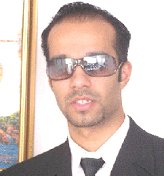
|